- Home » Expat Articles » Interviews » American Expat Living in Colombia - Interview with Jeremy
American Expat Living in Colombia - Interview with Jeremy
| Published: | 22 Mar at 9 AM |
Want to get involved?
Become a Featured Expat and take our interview.
Become a Local Expert and contribute articles.
Get in touch today!
Become a Local Expert and contribute articles.
Get in touch today!
Filed: Interviews,Colombia
Jeremy is a normal guy with a dry sense of humor, trying to sarcastically joke his way across the world. He has a passion for languages, cultural eccentricities, and food. After getting his Bachelor's in communication, it is his goal to listen and learn from as many different people as he can, and he has found success in wherever he has gone. He'll answer anything you throw at him, being sometimes uncomfortably transparent, but he also loves to listen. For this reason, don't hesitate to contact him; you'll feel like you've made a friend instantly. Jeremy's expat blog is called Los Viajes of an American (see listing here)
Where are you originally from?
I was born and raised in Barberton, Ohio, a quiet suburb about 40 minutes south of Cleveland. It's one of those places that few people leave for good, so being one of those has given me interesting insight on my hometown. I love having this background though, because it's a huge part of who I am. Once I graduated high school I moved to Cincinnati and started a new lifestyle.
In which country and city are you living now?
I live in a small town outside of Barranquilla, Colombia, a city of about 1.5 million people on the Caribbean coast. My town has about 3,000-5,000 people, and definitely has a small town feeling. In a few short months I already feel as though I know a large part of it.
How long have you lived in Colombia and how long are you planning to stay?
I have been here for almost 7 months and I will stay until at least November 2015, when my standard contract ends.
Why did you move to Colombia and what do you do?
I moved here with the Peace Corps, a non-profit organization in the US that sends volunteers all over the world to help with various projects. In my case, I have been sent here to teach English in the small community.
Did you bring family with you?
No, I came on my own. My family does not have many other travelers in it.
How did you find the transition to living in a foreign country?
I thought my year spent in Spain would have prepared me, but living in Madrid is much different than a poor country in Latin America. It has been wonderful, and overwhelmingly positive, but at points it's been exhausting. Things are much more different here than they were in Spain.
Was it easy making friends and meeting people; do you mainly socialise with other expats?
For me it was, because I understand how quickly you can become isolated if you don't make an effort. In fact, I feel so integrated with my Colombian community that when I spend time with the other Americans in my group, I tend to feel even more different from them.
What are the best things to do in the area; anything to recommend to future expats?
My favorite thing to do here is to spend time with a costeño(coastal) family. They are the most welcoming people I have ever met. They will serve you delicious food and drinks and make you feel at home. Make sure to go to a family birthday party where a "grupo millo" will be. They will play typical costeño music like vallenato, cumbia, and mapale, and you will have a blast listening to the drums and watching the everyday Colombians dance like experts.
What do you enjoy most about living in Colombia?
Being a part of this community, who really appreciates me. I work in a school that serves most of my community and having a native English speaker for them is really exciting. In such short time, people have gotten to know who I am without me even talking to them because of their curiosity. I often get invited to dinner at people's houses that I don't know. That is wonderful.
How does the cost of living in Colombia compare to home?
I get paid a salary similar to that of a costeño(Peace Corps policy) but if you were to come here for vacation, you would spend so little. A typical corriente(lunch) with rice, beans, chicken, plantains, salad, soup and juice ranges for $2.50 to $4.00 and a taxi ride from one end of the city to the other will cost no more than $8. It's very cheap.
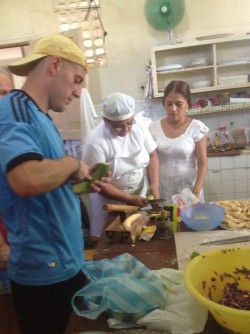
Combining cultures by making hamburgers with Colombian ingredients, like plantain and "tree tomato."What negatives, if any, are there to living in Colombia?
The heat is often unbearable and when it rains the streets become literal floods(there are no irrigation systems). People can also be painfully slow when it comes to working, and that's been a huge adjustment for me. If I wanted to work at the pace I did in the States, I would become angry very quickly. That said, I have learned to slow down and appreciate my free time.
If you could pick one piece of advice to anyone moving to Colombia, what would it be?
Learn to open up and slow down. Random strangers will approach you just to talk(it's not a very touristy city, as compared to neighboring Cartagena) and they don't mean any harm. Also, everything here moves at a slower pace. Just get used to it. People stand on escalators, take 5 minutes to buy an apple, and just move slow in general.
What has been the hardest aspect to your expat experience so far?
As part of a Peace Corps requirement, I am forced to live with a host family. Mine consists of just one woman, who is honestly a phenomenal human being. But due to some strange circumstances in her life, it has made things hard on me as a result. Also, sharing a living space with a motherly figure after many years on my own is just a weird situation.
When you finally return home, how do you think you'll cope with repatriation?
I think it will hit me really hard. After three months I got sent to Washington DC for medical reasons, and that was hard. I'll have to do this again in 2 years, after much more integration, and I think that will be incredibly difficult. Luckily I've fallen in love with a Colombiana who I plan to move back there with(actually following her decision to move there), so I'll still have that culture to help me.
What are your top 5 expat tips for anyone following in your footsteps?
My blog is essentially just a journal. It was a compromise between my family and I because I refused to take a camera(cameras make me feel removed from my surroundings). I document anecdotes, cultural reflections, and even some general ideas that cross my mind. I don't give advice or make lists, but instead just transfer my thoughts to paper.
How can you be contacted for further advice to future expats coming to your area?
You can go to my blog(jeremysamericanviajes.com) and leave a comment, or send me a direct message on Facebook if you choose: https://www.facebook.com/jeremy.booth.7106
Here's the interview with Jeremy...
Where are you originally from?
I was born and raised in Barberton, Ohio, a quiet suburb about 40 minutes south of Cleveland. It's one of those places that few people leave for good, so being one of those has given me interesting insight on my hometown. I love having this background though, because it's a huge part of who I am. Once I graduated high school I moved to Cincinnati and started a new lifestyle.
In which country and city are you living now?
I live in a small town outside of Barranquilla, Colombia, a city of about 1.5 million people on the Caribbean coast. My town has about 3,000-5,000 people, and definitely has a small town feeling. In a few short months I already feel as though I know a large part of it.
How long have you lived in Colombia and how long are you planning to stay?
I have been here for almost 7 months and I will stay until at least November 2015, when my standard contract ends.
Why did you move to Colombia and what do you do?
I moved here with the Peace Corps, a non-profit organization in the US that sends volunteers all over the world to help with various projects. In my case, I have been sent here to teach English in the small community.
Did you bring family with you?
No, I came on my own. My family does not have many other travelers in it.
How did you find the transition to living in a foreign country?
I thought my year spent in Spain would have prepared me, but living in Madrid is much different than a poor country in Latin America. It has been wonderful, and overwhelmingly positive, but at points it's been exhausting. Things are much more different here than they were in Spain.
Was it easy making friends and meeting people; do you mainly socialise with other expats?
For me it was, because I understand how quickly you can become isolated if you don't make an effort. In fact, I feel so integrated with my Colombian community that when I spend time with the other Americans in my group, I tend to feel even more different from them.
What are the best things to do in the area; anything to recommend to future expats?
My favorite thing to do here is to spend time with a costeño(coastal) family. They are the most welcoming people I have ever met. They will serve you delicious food and drinks and make you feel at home. Make sure to go to a family birthday party where a "grupo millo" will be. They will play typical costeño music like vallenato, cumbia, and mapale, and you will have a blast listening to the drums and watching the everyday Colombians dance like experts.
What do you enjoy most about living in Colombia?
Being a part of this community, who really appreciates me. I work in a school that serves most of my community and having a native English speaker for them is really exciting. In such short time, people have gotten to know who I am without me even talking to them because of their curiosity. I often get invited to dinner at people's houses that I don't know. That is wonderful.
How does the cost of living in Colombia compare to home?
I get paid a salary similar to that of a costeño(Peace Corps policy) but if you were to come here for vacation, you would spend so little. A typical corriente(lunch) with rice, beans, chicken, plantains, salad, soup and juice ranges for $2.50 to $4.00 and a taxi ride from one end of the city to the other will cost no more than $8. It's very cheap.

Combining cultures by making hamburgers with Colombian ingredients, like plantain and "tree tomato."
The heat is often unbearable and when it rains the streets become literal floods(there are no irrigation systems). People can also be painfully slow when it comes to working, and that's been a huge adjustment for me. If I wanted to work at the pace I did in the States, I would become angry very quickly. That said, I have learned to slow down and appreciate my free time.
If you could pick one piece of advice to anyone moving to Colombia, what would it be?
Learn to open up and slow down. Random strangers will approach you just to talk(it's not a very touristy city, as compared to neighboring Cartagena) and they don't mean any harm. Also, everything here moves at a slower pace. Just get used to it. People stand on escalators, take 5 minutes to buy an apple, and just move slow in general.
What has been the hardest aspect to your expat experience so far?
As part of a Peace Corps requirement, I am forced to live with a host family. Mine consists of just one woman, who is honestly a phenomenal human being. But due to some strange circumstances in her life, it has made things hard on me as a result. Also, sharing a living space with a motherly figure after many years on my own is just a weird situation.
When you finally return home, how do you think you'll cope with repatriation?
I think it will hit me really hard. After three months I got sent to Washington DC for medical reasons, and that was hard. I'll have to do this again in 2 years, after much more integration, and I think that will be incredibly difficult. Luckily I've fallen in love with a Colombiana who I plan to move back there with(actually following her decision to move there), so I'll still have that culture to help me.
What are your top 5 expat tips for anyone following in your footsteps?
- Be the person you really want to be. This comes more from my experience in Spain, because once I got to a place where I knew nobody, I took advantage. In other words, I changed entirely; both physically and mentally. I've shaved my head, made my wardrobe more vibrant, become much more social and stopped being afraid of girls. Moving abroad let me be who I wanted without worrying about anyone else.
- Open up and take it all in. Whatever culture you're in will be wildly different from yours. And while some cultural things will seem absurd, try them on for size. You'll be shocked at what you actually might enjoy.
- Hold on to a couple habits that you really care about. Contrary to the previous tip, it's incredibly important to maintain some habits you have. They will serve as comforts throughout your time abroad, despite perhaps wanting full immersion. These habits will keep you sane, I promise.
- Eat, dance, and love. Take part in the most natural pleasures we have as humans. Screw your worries about food. Don't eat with your eyes. Don't even eat with your stomach. Eat with your soul, and feel the pride and love in which people cook their food. Dance the local dance even though you have two left feet and can't snap your fingers. Also, if you have the opportunity to fall for someone, don't let a lingering deadline deter you. Take advantage and see what happens. He/she may be the one.
- Write it all down. It can be a blog or a journal, but you need some outlet to share your excitement, frustration, fears, and wonders. Someday you'll love to read it all over again, but I prefer to think about the benefit in the moment. You'll need the outlet.
My blog is essentially just a journal. It was a compromise between my family and I because I refused to take a camera(cameras make me feel removed from my surroundings). I document anecdotes, cultural reflections, and even some general ideas that cross my mind. I don't give advice or make lists, but instead just transfer my thoughts to paper.
How can you be contacted for further advice to future expats coming to your area?
You can go to my blog(jeremysamericanviajes.com) and leave a comment, or send me a direct message on Facebook if you choose: https://www.facebook.com/jeremy.booth.7106
Grab a featured expat badge that links to this interview!
 Copy and paste code to display the Featured Expat Badge:
Copy and paste code to display the Featured Expat Badge:Comments » No published comments just yet for this article...
Feel free to have your say on this item. Go on... be the first!
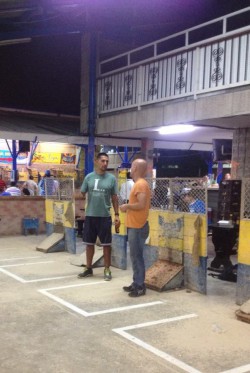

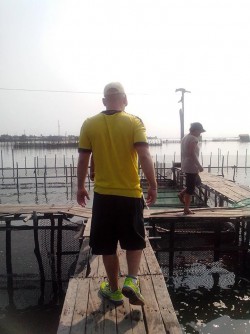
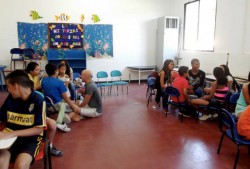
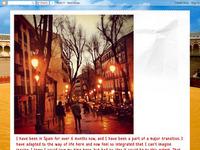 Jeremy is an American expat living in Colombia. Blog description: After spending a life-changing year in Spain, I joined the Peace Corps and got sent to Colombia. Specifically, I am in beautiful Barranquilla on the Caribbean coast. In my blog you will read about culture shock, my job as an English teacher, hilarious anecdotes or just every day life.
Jeremy is an American expat living in Colombia. Blog description: After spending a life-changing year in Spain, I joined the Peace Corps and got sent to Colombia. Specifically, I am in beautiful Barranquilla on the Caribbean coast. In my blog you will read about culture shock, my job as an English teacher, hilarious anecdotes or just every day life.





